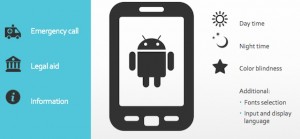 ASTANA – A new smart phone application developed by the UN Development Programme office in Kazakhstan to help the hearing impaired contact emergency services will be presented at the Dec. 12 session of the Coordination Council on Social Protection of Persons with Disabilities. The session will be attended by representatives from the Ministry of Emergency Situations and the Ministry of Healthcare, other decision-makers and persons with disabilities.
ASTANA – A new smart phone application developed by the UN Development Programme office in Kazakhstan to help the hearing impaired contact emergency services will be presented at the Dec. 12 session of the Coordination Council on Social Protection of Persons with Disabilities. The session will be attended by representatives from the Ministry of Emergency Situations and the Ministry of Healthcare, other decision-makers and persons with disabilities.
The application, which was developed in coordination with AziaDevelop, an Almaty-based software development company, is intended to be a simple, direct way for people with hearing impairments to connect with emergency services. Users register and fill out a profile containing their address and phone number, as well as key medical information. Then, by pressing a button on their smart phones, users can send a signal to the emergency services in their location. The signal will bring up the user’s profile on a terminal at the emergency services’ location. The application has options for Kazakh or Russian languages.
In addition to the emergency button, the application contains legal information pertaining to people with disabilities and contact information for mediation organisations.
The idea for the application was born when the UNDP office in Bratislava issued a call for proposals for innovative ways to use information technology to increase engagement among hard-to-reach social groups, said Maral Sheshembekova, manager of the UNDP Kazakhstan office’s project to improve the country’s social protection system in line with international standards. The UNDP Regional Centre in Bratislava has supported the development of the application.
“We came together and said ‘What can we do with technology?’,” Sheshembekova said. She and her colleagues, Communications Specialist Assel Tleof, Project Assistant Nazym Zhussupova and Project Expert Olga Yugai, came up with the idea together, she said.
“And of course, we started to call our partners to discuss what kind of problems they have, because this kind of information should come from the beneficiary,” Sheshembekova said. They called people with disabilities, consulted with the Astana Society of Deaf People and other organisations for the hearing impaired, and learned that most hearing impaired people rely on neighbours or family members to contact emergency services for them. When they learned about the idea for the application, Sheshembekova said, “They said, ‘Oh, that’s a good idea!’”
Dzhangeldy Bekbotyrov, chairman of Astana Society of Deaf People, is a fan of the idea, according to the UNDP press centre. “It is very relevant for us to have this application. We’ve been experiencing a lot of discomfort associated with emergencies. Each of us has our own assistants, so we had always to depend on them. Even if my kid had a night fever, I had to contact my assistant, and wait for his help. We believe this application will ease that stress,” he said, as reported by their website.
They tested the application with hearing impaired persons, said Zhussupova, and a database with those users’ information has been created. The development process took about a month, she said. Though they originally planned to create the application and create the connection with emergency services, Sheshembekova said, funding limitations mean they have only been able to fund the creation of the user end of the application. “We have a database of 20 people with hearing disabilities, but it’s not connected to any emergency centre yet. But it could be, now. The application is ready. It can be tested. It can be checked right now.”
The process of connecting their application with Astana’s emergency services will not be expensive or complicated, Sheshembekova said: just the cost of a computer dedicated to receiving the application’s signals, or dedicating a staff member to monitoring them, perhaps. “We’re hoping when we present it to the Ministry of Emergency Situations, to this coordination council, they’ll take the idea and it can grow into a very big project.”
A UK application exists that allows hearing impaired people to send text messages to the UK’s emergency services, and the Malaysian government launched an application this year that will transmit the location and other key information of hearing-impaired users to that country’s first responders. “This idea, over the past year or two, has been in the air in different ways,” Sheshembekova said.
“Of course, there are many ideas about optioning it, customising it, making it less simple, but the idea at first was just that you push the button and the emergency systems come. … The idea is simple, and it’s really useful. So we created this pilot,” Zhussupova said.
In 2008, the UN adopted the Convention on the Rights of Persons with Disabilities. In December of that year, Kazakhstan signed this convention, meaning the country agrees with the principles and is preparing to ratify it by working with their internal, state bodies, Sheshembekova said.
“Since that time, the UNDP Kazakhstan office has had a mandate to work on the issue and we’ve lately gotten funding from the British Embassy, which supports us in this project.” They work with decision makers like members of parliament, the Ministry of Labour and Social Protection, the Human Rights Commission and others, she said.
Kazakhstan’s government has created the National Action Plan to Improve the Quality of Life for People with Disabilities in Kazakhstan for 2012-2018, which works step by step toward a paradigm shift regarding the treatment of people with disabilities away from providing care and toward their full integration into society. According to that plan, measures to develope disabled-accessible emergency services are scheduled for 2016, Sheshembekova said. This simple idea, however, came along early.
